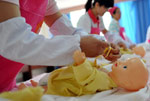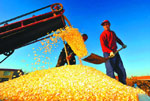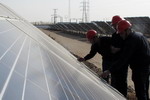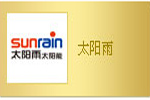Domestic toy market perks up
Updated: 2011-11-07 13:50
By Michael Wei (China Daily)
|
|||||||||||
|
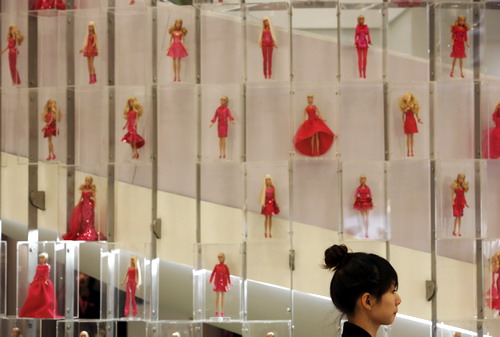 Mattel Inc Barbie dolls on display at the Barbie flagship store in Shanghai. [Photo/Bloomberg] |
Prices on the rise but products are still cheaper than imported brands
SHANGHAI - Wanted: BFF; pretty in pink; not too trashy; lower maintenance than Barbie. Must speak Chinese.
Meet Princess Secret, a potential best friend forever for the children of China's swelling mass of consumers, who increasingly demand better-quality toys at cheaper prices than foreign brands can offer. The doll's manufacturer, closely held China Focus (Yiwu) Ltd, is among Chinese exporters seeking licenses to sell on the domestic market as overseas growth flags.
"Our products probably cost twice as much as those designed for the local market, but that's not a problem because they're still cheaper than imports," Maggie Zhang, a sales manager, said at the country's biggest trade fair last month, while staffing a stall stacked with Princess Secret pink dolls, gloves, scarves and cosmetic bags.
The nation's toy market is expected to double to 60 billion yuan ($9.4 billion) by 2015 from 2010, according to the China Toy & Juvenile Products Association. In contrast, overseas sales grew 8.9 percent in the first nine months of the year, lagging the 23 percent growth in total China exports.
"Chinese toy exporters are coming to a turning point where domestic growth is starting to outpace that of overseas orders," said Hua Zhongwei, a macroeconomic analyst with Huachuang Securities in Beijing.
Mattel in March closed its first Barbie-dedicated store in China two years after opening the six-story Shanghai outlet. The toy company, which didn't provide a reason for the closure, had lowered the outlet's sales targets by at least 30 percent.
Mattel is now expanding its distribution network into smaller Chinese cities, Jean-Christophe Pean, Asia-Pacific general manager, said in an e-mailed response to queries.
Chinese toy exporters, who made $7.9 billion of overseas sales in the first nine months according to customs data, are also turning their eyes to home because of weak prospects in the US and Europe.
The United States Conference Board's confidence index slumped in October to the lowest level since March 2009 as Americans' outlooks for jobs and incomes soured, figures from the New York-based private research group showed on Oct 25.
The US toy market is about $21.9 billion and the global market is about $83.3 billion, according to NPD Group, a market research company based in Port Washington, New York.
Growth in shipments to Europe, China's biggest export market, slowed to 9.8 percent in September, from 22 percent in August, amid the sovereign-debt crisis in the eurozone. Outlook for trade this quarter and in the first three months of next year is "grim", Shen Danyang, a spokesman for China's Ministry of Commerce, said at an Oct 19 briefing in Beijing.
At the Canton Fair in the southern city of Guangzhou last month, some of the more than 23,700 exporters with stalls there reported a drop in interest from foreign buyers. The semi-annual event that started in 1957, formally called the China Import and Export Fair, accounts for one-quarter of the country's trade, its website claims.
"Business isn't good," said Ken Shum, a product manager at table-soccer maker Euland Industrial Co, based in Dongguan, Guangdong, as he played on his cell phone at the company's stall. This year is his fifth visit. "We may not come again next time," he said.
At this year's fair, 168,280 foreign purchasers registered, compared with 207,103 in the spring fair event and 200,612 in the autumn show last year. The final number will be higher when unregistered visitors are tallied by the organizer after the event closes on Friday.
China Focus' Zhang said the company will probably attend next year's fair mostly to maintain relations with clients, as their orders are still growing. The Yiwu company received most of its $5 million of revenue last year selling about 1,500 types of toys to the US and the Europe. Chinese retailers such as China Resources Enterprise Ltd are starting to show interest, Zhang said.
"There definitely is a market in China," she said. "It's a step we must make in the future."
Established brands also have an edge. At the Next Age Department Store in Shanghai's Pudong district on Nov 2, six-year-old Yue Yue had eyes only for Barbie. After passing by a 128 yuan doll made by Guangzhou Star-Moon Toys Co, she checked out the range of Barbies before buying a "Princess Charm School" model at 199 yuan.
"My girl has always liked Barbie," said 34-year-old housewife Yang Yuan, Yue Yue's mother. "Barbies aren't cheap, but local brands are also catching up in terms of price. I'd rather spend a little more on better quality and a better brand."
Bloomberg News
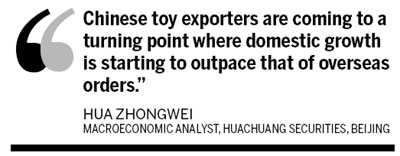
Related Stories
Toy story shows quality and value can be successful 2011-08-19 09:02
Good vibrations for adult toy industry 2011-03-15 15:04
Brazil sets conditions on China's toy story 2010-12-30 09:00
- Healthy outlook for medical tourists
- China's trade surplus rebounds to $24b in Oct
- China's Oct CPI to ease to 5.5%
- China mulls special fund to boost arts
- Govt urged to open up crude oil import market
- Wenzhou credit crisis eases up
- Offshore oil rules may be overhauled
- China to inject $158b into money market






